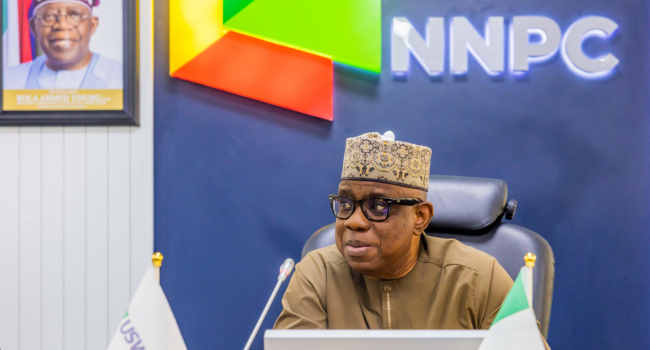*Targets $60bn investment by 2030
In a decisive stride towards energy security and industrial transformation, the Nigerian National Petroleum Company Limited, NNPCL, has announced the successful crossing of the River Niger by the Ajaokuta-Kaduna-Kano, AKK Gas Pipeline, marking a major engineering feat and a critical step in Nigeria’s energy infrastructure development.
Bashir Bayo Ojulari, Group Chief Executive Officer of the NNPCL, disclosed this during his keynote address at the 24th NOG Energy Week in Abuja, describing the river crossing as a particularly challenging phase of the AKK project that has now been surmounted.
The AKK pipeline, scheduled for completion in Q4 of 2025, is a key component of the Nigeria’s Gas Master Plan, designed to boost industrialization, expand power generation, and support energy transition efforts.
Ojulari also revealed a turnaround in the country’s oil pipeline operations, stating that Nigeria recorded 100% crude oil pipeline availability in June 2025 — a dramatic recovery from mid-2022.
Ojulari also revealed a turnaround in the country’s oil pipeline operations, stating that Nigeria recorded 100% crude oil pipeline availability in June 2025.
The NNPC through industry-wide security collaboration and stakeholder engagements, we’ve moved from crisis to control,” he said, noting that this operational stability is already attracting new investments into onshore and shallow water assets.
Lauding the Petroleum Industry Act (PIA) 2021, Ojulari noted that the legislation has been pivotal in transforming the NNPC from a government-owned corporation into a commercially driven limited liability company.
“The PIA has allowed NNPC to independently manage its financing and partnerships,” he said. “So today, NNPC is able to raise the finance for all its businesses — a shift that is driving growth across the sector.”
He called for greater collaboration across the industry, especially in cases where certain partners struggle to raise the capital required for project delivery.
On expanding Gas Production and Utilization, Ojulari also emphasized the need to deepen natural gas production to support power generation, gas-based industries, transportation, economic development, and revenue growth under the National Gas Expansion Programme and the Decade of Gas (2021–2030).
“We’re committed to continuously improving our processes, technology and operations to expand gas utilization and reduce reliance on oil alone,” he said.
Investment Surge: $17bn in 2024, $60bn Target by 2030:
According to Ojulari, Nigeria’s energy sector attracted $17 billion in investments in 2024 and the NNPC is targeting a minimum of $30 billion by 2027 and $60 billion by 2030.
“These investments are critical to achieving our national aspiration of raising sustainable crude oil production to 2 million barrels per day by 2027 and 3 million barrels by 2030,” he stated.
The GCEO outlined a three-pronged approach to achieving these targets:
1. Strategic partnerships with international oil companies (IOCs), technology providers, contractors, consultants, and capital markets.
2. Performance contracts and clearly defined key performance indicators to ensure accountability and measurable results across all levels of collaboration.
3. Investments in diversification, digital transformation, and, most importantly, in our people.
As the conference progresses, Ojulari challenged participants and stakeholders to make the NOG a place where deals are made.
My vision is to see it transition from a talk shop into a deal room where performances are celebrated and investment deals are closed,” he declared.
With bold targets, major infrastructure milestones, and renewed confidence in Nigeria’s oil and gas ecosystem, the NNPCL is positioning itself and the nation for a future defined by energy security, innovation, and industrial prosperity.









